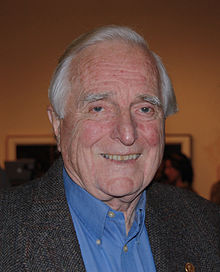
Back Douglas Engelbart Afrikaans دوغلاس إنجيلبارت Arabic دوجلاس انجيلبارت ARZ Douglas Engelbart AST Duqlas Enqelbart Azerbaijani داقلاس انقلبارت AZB Дъглас Енгълбърт Bulgarian ডগলাস কার্ল এঙ্গেলবার্ট Bengali/Bangla Douglas Engelbart BS Douglas Engelbart Catalan
Douglas Engelbart | |
|---|---|
 Engelbart in 2008 | |
| Born | Douglas Carl Engelbart January 30, 1925 Portland, Oregon, U.S. |
| Died | July 2, 2013 (aged 88) Atherton, California, U.S. |
| Alma mater |
|
| Known for | |
| Awards |
|
| Scientific career | |
| Fields |
|
| Institutions |
|
| Thesis | A Study of High-Frequency Gas-Conduction Electronics in Digital Computers (1956) |
| Doctoral advisor |
|
| Website | dougengelbart |
Douglas Carl Engelbart (January 30, 1925 – July 2, 2013) was an American engineer, inventor, and a pioneer in many aspects of computer science. He is best known for his work on founding the field of human–computer interaction, particularly while at his Augmentation Research Center Lab in SRI International, which resulted in creation of the computer mouse, and the development of hypertext, networked computers, and precursors to graphical user interfaces. These were demonstrated at The Mother of All Demos in 1968. Engelbart's law, the observation that the intrinsic rate of human performance is exponential, is named after him.
NLS, the "oN-Line System", developed by the Augmentation Research Center under Engelbart's guidance with funding primarily from ARPA (as DARPA was then known), demonstrated numerous technologies, most of which are now in widespread use; it included the computer mouse, bitmapped screens, hypertext; all of which were displayed at "The Mother of All Demos" in 1968. The lab was transferred from SRI to Tymshare in the late 1970s, which was acquired by McDonnell Douglas in 1984, and NLS was renamed Augment (now the Doug Engelbart Institute).[6] At both Tymshare and McDonnell Douglas, Engelbart was limited by a lack of interest in his ideas and funding to pursue them and retired in 1986.
In 1988, Engelbart and his daughter Christina launched the Bootstrap Institute – later known as The Doug Engelbart Institute – to promote his vision, especially at Stanford University; this effort did result in some DARPA funding to modernize the user interface of Augment. In December 2000, United States President Bill Clinton awarded Engelbart the National Medal of Technology, the U.S.'s highest technology award. In December 2008, Engelbart was honored by SRI at the 40th anniversary of the "Mother of All Demos".
- ^ a b Thierry Bardini. "Turing Award Winners: 1997". Association for Computing Machinery (ACM). Archived from the original on June 30, 2013. Retrieved July 4, 2013.
- ^ "Douglas C. Engelbart". Hall of Fellows. Computer History Museum. Archived from the original on July 2, 2012. Retrieved June 17, 2012.
- ^ Engelbart, D. C. (1995). "Toward augmenting the human intellect and boosting our collective IQ" (PDF). Communications of the ACM. 38 (8): 30–32. doi:10.1145/208344.208352. S2CID 8192136. Archived (PDF) from the original on May 1, 2015. Retrieved September 1, 2015.
- ^ "The Doug Engelbart Institute". The Doug Engelbart Institute. Archived from the original on July 14, 2012. Retrieved June 17, 2012.
- ^ "Ph.D. Dissertations – 1955". Electrical Engineering and Computer Science, College of Engineering, University of California Berkeley. Archived from the original on May 1, 2015. Retrieved July 3, 2013.
- ^ "the Doug Engelbart Institute website". Archived from the original on December 9, 2018. Retrieved December 9, 2018.
© MMXXIII Rich X Search. We shall prevail. All rights reserved. Rich X Search